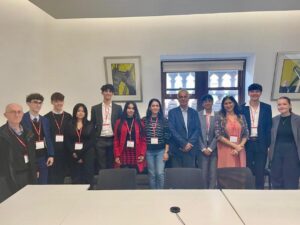Onward and upward in Economics: sixth-former wins again

Final-year pupil Avi Juneja was invited to the Foreign Office after winning a prestigious essay competition, beating off competition from 600 other entrants.
 Avi triumphed in the Next Generation Essay Economics competition – run by the Foreign, Commonwealth and Development Office (FCDO) and London School of Economics and Political Science (LSE) – with his submission focusing on debt payments by developing countries.
Avi triumphed in the Next Generation Essay Economics competition – run by the Foreign, Commonwealth and Development Office (FCDO) and London School of Economics and Political Science (LSE) – with his submission focusing on debt payments by developing countries.
It was Avi’s second major competition win of the year: in the spring, an essay he wrote on the gig economy took overall first prize in a competition organised by Northeastern University London.
Headmaster Neil Enright said: “My sincere congratulations go once again to Avi, who researched and wrote his essay in his own time on a topic which intrigued him – he thus embodies very well the spirit of academic curiosity and free-thinking scholarship that we seek to nurture at QE.”
The Next Generation competition was open to any UK school pupils. Entrants had to pick one of four questions, all of which looked at major economic challenges facing their generation.
Avi selected this question: According to the UN, 3.3 billion people now live in countries where debt interest payments are greater than expenditure on health or education. What actions could governments globally take to ensure debt does not prevent investment towards development?
“One reason that I chose this question over the others is that I had read a book called Austerity written in 2013, which mentioned how Greece suffered from the sovereign debt crisis,” he said.
“Having read that Greece had won the Economist’s best performing economy of the year in 2023, I wanted to bridge the gap and see what could be done to transform a nation so significantly.
“Leading on from that, I was keen to understand more about the esoteric topics of bond markets and debt instruments, as they have such tangible effects for citizens in an economy.
 Avi, who is currently applying to read Economics at Cambridge, said that his research for the essay was much longer than that for previous competitions. “It took a while to grasp a lot of the complex ideas like bond premiums, payoff structures and cyclicality of demand for bonds: I think it was a week where I researched for the essay in my free time, letting the sources take me down rabbit holes before I eventually felt I understood enough to write it.
Avi, who is currently applying to read Economics at Cambridge, said that his research for the essay was much longer than that for previous competitions. “It took a while to grasp a lot of the complex ideas like bond premiums, payoff structures and cyclicality of demand for bonds: I think it was a week where I researched for the essay in my free time, letting the sources take me down rabbit holes before I eventually felt I understood enough to write it.
“I advocated for the use of State-Contingent Debt Instruments* and more stringent transparency requirements to alleviate the pressures of high debt interest payments faced by many nations.”
The actual writing took a few hours in his local library.
During his visit to the historic building in Whitehall, Avi met both the FCDO’s Chief Economist, Adnan Qadir Khan, and Deputy Chief Economist, Fergus Cumming, and discussed with them what he had written. Also there were the competition’s runners-up and shortlisted entries. Professor Khan said Avi’s success was “a fantastic achievement, considering we had 600 entries this year!”
Avi added: “The Foreign Office is incredibly grand and ornate, so I feel very fortunate to have seen it. There was also a cash prize of £500, which is always nice.”
*State-Contingent Debt Instruments (SCDIs) are instruments that link a sovereign state’s debt service payments to its capacity to pay, with that capacity linked to real-world variables or events.
